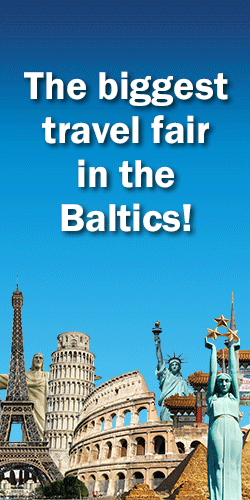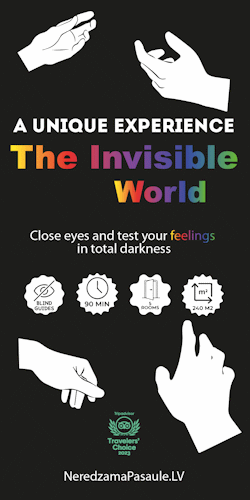The sheer volume of wild nature in Latvia makes this one of the greenest countries in the world. But Latvia also has some of the world’s most beautiful Art Nouveau architecture, delicious food, and a highly developed spa culture. Here are just a few of the many things to see and do in Latvia!
Riga’s Art Nouveau
Reklāma
At the turn of the 20th century, when the ‘new art’ of Art Nouveau (Jugendstil) prevailed in Europe, Riga was in fine fettle – the economy was booming, and the growing number of residents needed homes. As a result, nearly one third of all the buildings in central Riga reflect the Art Nouveau style, with the richest collection in the Quiet Centre.
Several of the buildings along Alberta Street are the work of architect Mikhail Eisenstein (1867–1920), the father of Soviet cinema master Sergei Eisenstein (1898–1948). Today, some of the finest restaurants in the city reside in these architectural gems. More information here
Āraiši Lake Fortress Archaeological Park
Āraiši Lake Fortress, a painstaking reconstruction of a fortified settlement dating to the 9th–10th centuries, is the only site of its kind in Europe. The park also features a complex of wooden abodes replicating ones found here in the Stone and Bronze Ages as well as the ruins of a medieval castle.
Last year, the park unveiled a new interactive exhibition that explores the unique archaeological findings discovered on site. Visiting the park should be on every history buff’s bucket list. But the trip is also worth it just for a glimpse of the breathtaking surroundings of Āraiši Lake. More information here
Ziedlejas wellness resort
Sauna rituals have a crucial place in Latvian folklore. However, the Ziedlejas wellness resort proves that not everything traditional is necessarily outmoded. Here you can enjoy traditional Latvian spa rituals carried out by masters of sauna-bathing.
The sauna, or pirts in Latvian, is a place for physical and mental cleansing and is great for one’s well-being. In addition to bathing houses, Ziedlejas features immaculate guesthouses that have already gone viral on Latvian Instagram.
The resort is situated in verdant Gauja National Park. See ziedlejas.lv to book your adventure. More information here
Kuldīga
Stroll along the narrow cobbled streets of Kuldīga, and you’ll feel like you’ve travelled back in time. Nestled in the middle of western Latvia, the town boasts a vast collection of well-preserved 17th-century timber houses – relics of Kuldīga’s heyday, when it was a capital of the Duchy of Courland.
Many of the wooden buildings have since been transformed into restaurants, cafés, and guesthouses, giving guests plenty of reason to linger. The town also has a grand entrance – a graceful 19th-century brick bridge that offers a killer view of the Ventas Rumba waterfall. More information here
Karosta
Situated at the northern end of Liepāja, the so-called Karosta (War Port) area was a forbidden zone up until the 1990s. Initially built as a military base of the Russian Empire under Tsar Alexander III, today the vestiges of the Soviet army and the wild Baltic Sea coast make this one of the most exciting destinations for strolling and exploring.
Highlights include the opulent St. Nicholas Naval Cathedral and the Northern Forts, which flaunt a large piece of graffiti by French artist Al Sticking. But beware – it can get quite windy here. They don’t call Liepāja the ‘city of wind’ for nothing. More information here
Daugavas Loki Nature Park
Latgale, Latvia’s easternmost region, is dubbed the ‘land of blue lakes’. But in addition to countless mesmerising lakes, it’s also home to the most scenic part of the Daugava River. Daugavas Loki, which translates to ‘meanders of the Daugava River’, is a nature park comprising eight bends in the river, each four to six kilometres long.
When the weather is warm, locals love to sail the calm river waters on rafts and enjoy the scenery. When you’re here, make sure to visit Vasargelišķi Sightseeing Tower. Climb the 24-metre structure to enjoy beautiful views and the picturesque meanders of the Daugava from above. More information here
Veczemju Bluffs
Latvia’s 500 kilometres of Baltic Sea coast are mainly characterised by broad, sandy shores. But there are some rare stretches of rocky seashore in the western region of Kurzeme as well as in the Vidzeme region north of Riga.
The 12-kilometre rocky shoreline in Vidzeme also features sandstone bluffs. Carved by the waves, these curvy red bluffs are a true marvel. More information here
Abgunste Manor
At the beginning of the 20th century, there were around 2000 manors in Latvia, primarily owned by Baltic-German noblemen. Today a number of these stately dwellings have been repurposed into hospitality establishments.
Abgunste Manor was built in the 1780s; it later burned down during riots, was rebuilt, and eventually also housed a school.
After a meticulous renovation in 2016, the manor reopened its doors as a guest house and venue for special occasions such as weddings and birthdays. The manor extols its historical heritage – each suite is romantically furnished and gives a glimpse into the majesty of a bygone age. More information here
Engure Lake Nature Park
With countless lakes, rivers, bogs, and a long segment of Baltic coastline, the diversity of Latvian nature is a constant delight. This nature park encapsulating Engure Lake boasts spectacular scenery and wildlife.
The observation towers sitting around the lake are a favourite spot for local ornithologists, and the grasslands are frequented by wild horses and various breeds of cows. More information here
Alūksne
Located in the northeast corner of Latvia, Alūksne is one of the most idyllic towns in Latvia. The town is defined by Alūksne Lake, which in summer brims with sun-flushed locals enjoying the warm weather. Several boathouses along its shores have been transformed into lovely accommodations equipped with boats.
Alūksne is a walkable town, and two of the stops worth including in your stroll are Temple Hill Park (with its glorious granite rotunda called the Temple of Glory) and the small train known locally as Bānītis. The regional narrow-gauge railway was launched in 1903, and the surviving 33-kilometre route still operates daily between Alūksne and Gulbene.
A swaying ride in the carriages built in the mid-20th century is a fun way to appreciate the landscape of the Vidzeme region. A new multi-sensory exhibition telling the history of the Bānītis was launched in 2018. The exhibit won the Latvian Architecture Award in 2019. More information here




